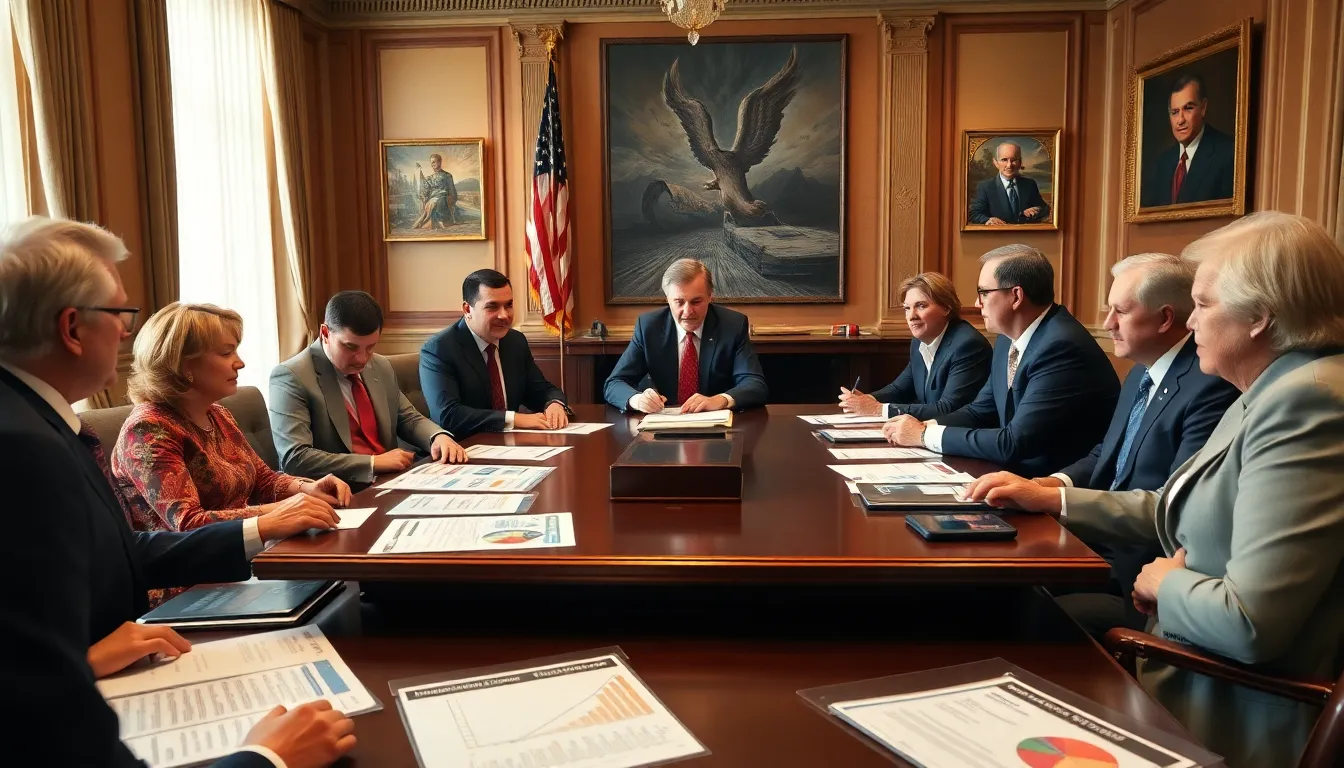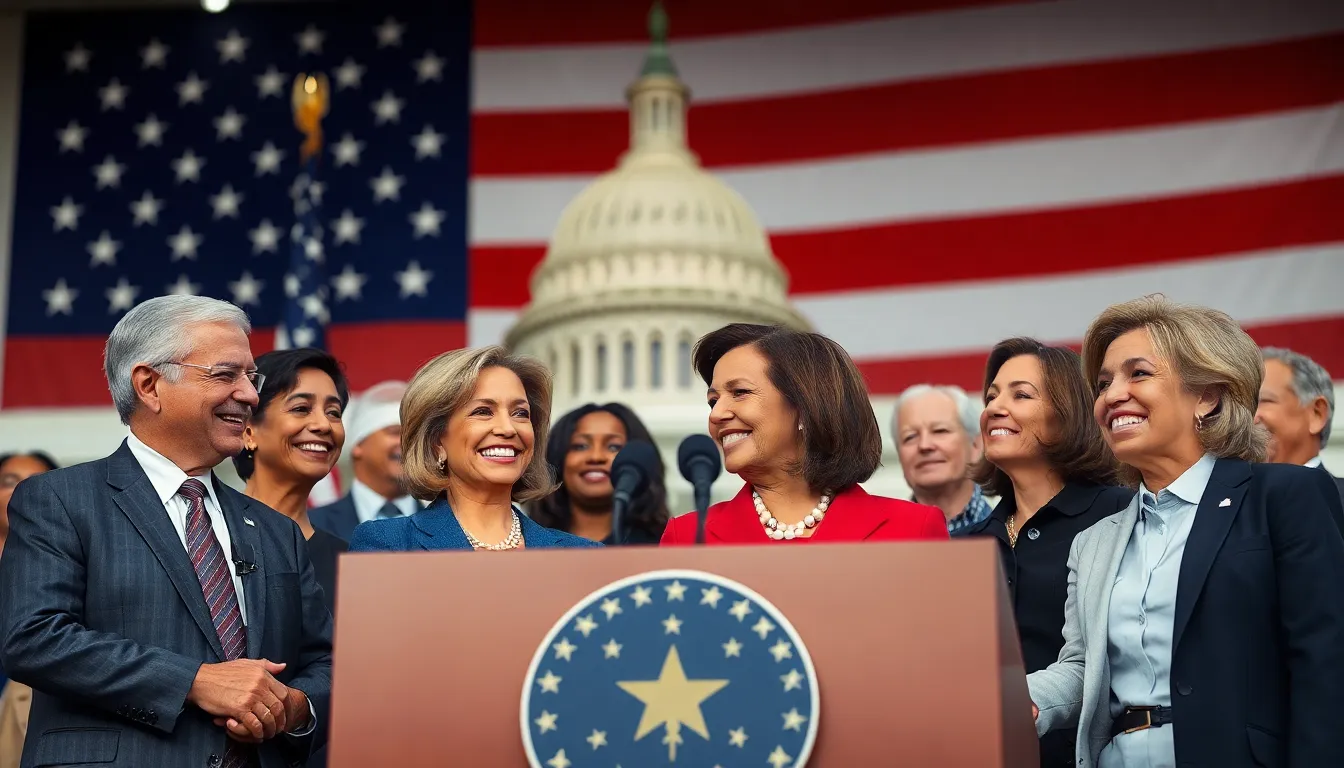Table of Contents
ToggleJoe Biden took office amid significant challenges, from a global pandemic to economic uncertainty. Since January 2021, his administration has focused on addressing these pressing issues while also pursuing long-term goals. With a commitment to unity and recovery, Biden has aimed to restore trust in government and promote policies that benefit a wide range of Americans.
His accomplishments span various sectors, including health care, infrastructure, and climate change. By championing major legislation like the American Rescue Plan and the Bipartisan Infrastructure Law, Biden has sought to revitalize the economy and improve the nation’s infrastructure. As his presidency continues, understanding what he’s achieved provides insight into the direction of the country and the impact of his policies on everyday lives.
Overview of Biden’s Presidency
Biden’s presidency commenced in January 2021, characterized by attempts to navigate multiple crises, including the COVID-19 pandemic and economic turbulence. His administration targeted immediate relief and long-term recovery through decisive actions.
Biden signed the American Rescue Plan Act in March 2021, allocating $1.9 trillion for economic stimulus. This plan included direct payments for individuals, extended unemployment benefits, and funding for vaccine distribution. As a result, this legislation aimed to bolster financial security for families and businesses impacted by the pandemic.
In November 2021, Biden enacted the Bipartisan Infrastructure Law, which dedicated $1.2 trillion to repair and upgrade transportation systems, utilities, and broadband. This law is expected to create millions of jobs while revitalizing aging infrastructure across the nation.
Biden has also prioritized climate change initiatives, reentering the Paris Agreement and committing to reducing greenhouse gas emissions by 50-52% from 2005 levels by 2030. Investment in clean energy technologies, electric vehicles, and sustainable infrastructure forms a significant aspect of his climate agenda.
In health care, Biden’s administration expanded access through various measures, including efforts to lower prescription drug costs and increase insurance coverage. These initiatives seek to improve health outcomes and affordability for millions of Americans.
Other accomplishments involve addressing social justice issues, particularly in areas of racial equity and police reform. Biden’s administration has formed task forces and proposed policies to tackle systemic racism and enhance equitable treatment.
Through these efforts, Biden aims to foster unity and recovery while addressing pressing national issues, reflecting his commitment to rebuilding America and improving the quality of life for its citizens.
Key Legislative Achievements


Joe Biden’s presidency includes significant legislative accomplishments aimed at addressing critical national challenges and fostering recovery. Two major pieces of legislation stand out during his tenure.
American Rescue Plan
The American Rescue Plan Act, signed into law in March 2021, allocated $1.9 trillion to provide economic relief during the COVID-19 pandemic. This plan included direct payments of $1,400 to individuals, which benefited families directly and stimulated consumer spending. Extended unemployment benefits supported jobless Americans, while funding for vaccine distribution ensured timely access to vaccinations. The plan also provided resources for schools, public health initiatives, and support for small businesses, ultimately enhancing financial security for millions of Americans.
Infrastructure Investment and Jobs Act
The Infrastructure Investment and Jobs Act, enacted in November 2021, allocated $1.2 trillion toward revitalizing and modernizing the nation’s infrastructure. This act committed funds to repair roads, bridges, and public transportation systems, aiming to create approximately 500,000 jobs. Investments targeted utilities, broadband expansion, and clean drinking water, addressing both present and future infrastructure needs. The legislation reflects a long-term vision for improving transportation and enhancing economic competitiveness.
Foreign Policy Initiatives
Biden’s foreign policy initiatives emphasize rebuilding alliances and addressing global challenges. His administration aims to restore the United States’ reputation internationally and confront issues like climate change.
Strengthening Alliances
Biden has focused on strengthening alliances with NATO members and partners in the Indo-Pacific. He reaffirmed the U.S. commitment to Article 5 of the NATO Treaty, emphasizing collective defense. In 2021, Biden hosted a summit with G7 leaders, resulting in a unified stance against authoritarianism and support for global democratic values. Additionally, the creation of the AUKUS pact between the U.S., the U.K., and Australia enhances security cooperation in the Indo-Pacific region, addressing concerns over China’s growing influence. Increased diplomatic engagement in multilateral forums, such as the United Nations and the World Health Organization, reflects his approach to tackling global issues collaboratively.
Climate Change Commitments
Biden’s administration prioritizes climate change as a central aspect of foreign policy. Rejoining the Paris Agreement marked a significant step, signaling a renewed commitment to international climate action. He set a target to reduce greenhouse gas emissions by 50-52% by 2030, building momentum for global climate initiatives. The 2021 Leaders Summit on Climate brought together key nations to foster cooperation on reducing carbon footprints and promoting clean energy innovations. Investments in green technologies support economic recovery while addressing climate challenges, showcasing the interconnection of foreign policy and environmental sustainability.
Economic Impact
Joe Biden’s presidency has had a significant impact on the U.S. economy, focusing on recovery and long-term growth amidst challenges like the COVID-19 pandemic. His administration’s policies aim to create jobs, manage inflation, and enhance economic stability.
Job Growth and Unemployment Rate
Job growth under Biden’s administration has shown positive trends, with millions of jobs added since early 2021. The unemployment rate dropped from 6.4% in January 2021 to 3.5% in September 2023, reflecting a recovery in various sectors. Notably, the leisure and hospitality industry experienced substantial gains, accounting for a significant portion of new jobs. Investments in infrastructure and clean energy initiatives are expected to bolster further job creation, with projections estimating the generation of half a million jobs from the Bipartisan Infrastructure Law alone. This growth supports not just current needs but also aims at building a robust workforce for future demands.
Inflation and Economic Challenges
Inflation has posed challenges during Biden’s tenure, with rates reaching levels not seen in decades. In June 2022, the inflation rate peaked at 9.1%, largely driven by supply chain disruptions and rising energy prices. To combat this, the Federal Reserve implemented interest rate hikes, which aimed to bring inflation under control. Biden’s administration also introduced measures to alleviate costs for families, such as the Gas Price Relief Plan. Despite these challenges, the economy has shown resilience, with GDP growth rebounding after initial setbacks during the pandemic, indicating a gradual return to stability.
Social Policies
Biden’s administration emphasizes social policies aimed at improving health care access and promoting equity for marginalized groups.
Healthcare Initiatives
Biden’s health care initiatives focus on expanding access and affordability. His administration extended open enrollment periods for the Affordable Care Act, increasing enrollment by millions. The American Rescue Plan provided subsidies to lower insurance premiums for families. Efforts to lower prescription drug prices include implementing a proposed pricing framework that enables Medicare to negotiate costs. Additionally, initiatives addressing mental health have expanded access to services, recognizing the importance of mental wellness during the pandemic. These changes aim to improve health outcomes for a diverse population across the country.
Racial and Gender Equity Efforts
Biden’s administration prioritizes racial and gender equity through various initiatives and policies. The establishment of the White House Gender Policy Council aims to advance gender equity in economic opportunity, education, and health care. Commitments to addressing police reform and racial disparities include executive orders promoting community engagement and accountability. The administration introduced proposals focused on equitable access to housing, education, and employment opportunities, targeting systemic inequities faced by marginalized communities. These measures reflect a commitment to fostering an inclusive society that values diversity and social justice.
Public Perception and Challenges
Public perception of Joe Biden’s presidency has fluctuated due to various factors, including economic conditions and policy decisions. These perceptions often shape the landscape of political challenges experienced by his administration.
Approval Ratings
Approval ratings for Biden reflect public sentiment about his handling of key issues. As of September 2023, his approval rate hovers around 43%, according to Gallup data. This represents a decline from initial ratings post-inauguration, where approximately 56% of Americans expressed approval. Approval ratings often correlate with public responses to inflation, economic recovery, and legislative progress.
| Date | Approval Rating (%) |
|---|---|
| January 2021 | 56 |
| July 2021 | 50 |
| January 2022 | 41 |
| June 2022 | 37 |
| September 2023 | 43 |
Criticism and Opposition
Biden faces criticism from various political factions. Detractors from the Republican Party often highlight inflation and economic concerns as significant failures. As inflation peaked at 9.1% in June 2022, critics argue that Biden’s policies contributed to economic instability rather than recovery. Some Democrats express dissatisfaction over perceived slow progress in enacting progressive reforms, particularly related to climate change and social equity.
Biden also navigates challenges from within Congress, where opposition from some lawmakers hampers bipartisan efforts. Legislative gridlock on key issues, such as gun control and immigration reform, contributes to perceptions of ineffective governance. Voter sentiment reflects a desire for decisive action in tackling pressing issues, influencing perceptions of his leadership and political capital.




